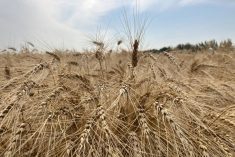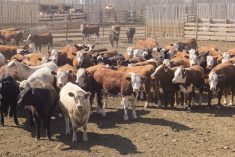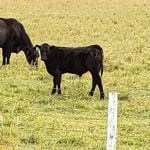Canada has lost its feed advantage with the U.S., as declining U.S. corn prices and an upward trend in western Canadian barley values over the past couple of months have caused the cost of gain in the two countries to narrow in.
Anne Dunford, a marketing specialist with Gateway Livestock Exchange at Taber, Alta., said U.S. feed costs have fallen. In August the cost of gain worked out to US$1.25 a pound in the U.S. Currently, the cost is hovering around the US95 cents per pound range, she said.
Read Also

U.S. livestock: Feeder cattle hit contract highs on tight supply
Chicago | Reuters – All Chicago Mercantile Exchange feeder cattle futures and most live cattle futures hit contract highs on…
The largest contributor to the downward trend in U.S. feed costs was U.S. corn values falling, she said, noting corn reached US$8 a bushel in August, while now it’s around US$6 a bushel.
A lack of fresh export demand has helped to pull corn down off its summer highs, she said.
As U.S. feed costs have fallen, the opposite has taken place in Canada. The cost of gain for cattle in Canada ranges from C93 to 95 cents per pound, as the upward trend in western Canadian barley values has pushed Canadian feed costs higher, she said.
Currently, delivery elevator prices for western Canadian feed barley are as high as C$4.88 per bushel in Alberta, according to data from Prairie Ag Hotwire. That’s up by about 50 cents per bushel since late August.
While the gap has narrowed as U.S. corn prices have fallen and western Canadian barely prices ascend, other factors have also contributed to Canada’s advantage being wiped out.
Rick Wright, a cattle buyer with Heartland Order Buying Co. at Virden, Man. said increased freight costs and a strong Canadian dollar would wipe out any cost savings in Canada also.
With both countries on an even playing field in feeder cattle costs, the World Trade Organization ruling on U.S. mandatory country-of-origin labelling in late November, which favoured Canada, is expected not to spur significant change in cattle costs in the short term.
The U.S. is likely to challenge the ruling and drag it through the appeals process for a while, he said.















